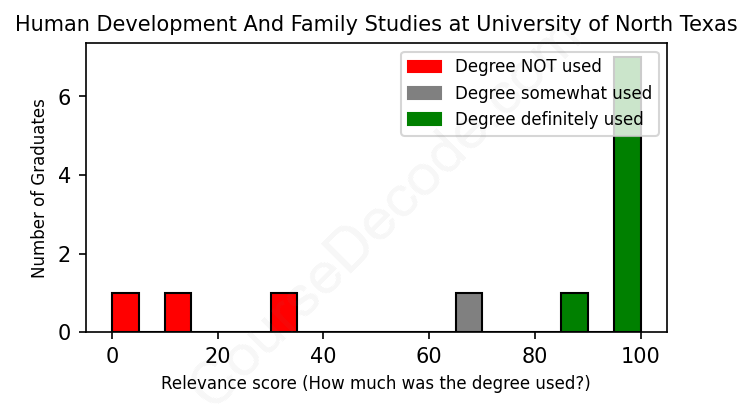
First, some facts. Of the Human Development And Family Studies graduates from University of North Texas we've analyzed , here's how many have used (or NOT used) their degree in their career:

These are estimates based on AI analysis of 12 LinkedIn profiles (see below).
The verdict? Above average. Overall, with an average relevance score of 74%, Human Development And Family Studies graduates from University of North Texas have a higher likelihood (+7%) of finding work in this field compared to the average graduate across all fields:
And for comparison, here's the chart for all profiles we've looked at across all degrees.
Also, after graduating, 58% of these graduates have pursued further education other than another Bachelor's degree (such as a Masters degree or other), compared to the average across all profiles of 35%. This suggests you may need more than just a Bachelors degree to be competitive as a Human Development And Family Studies graduate.
See the details:
|
Relevance score: 0% We think this person has NOT gone into a career related to their degree. We think this person has NOT gone into a career related to their degree.
DEGREE INFOGraduated in 2019 from University of North Texas with a Bachelors in Human Development And Family Studies. No other secondary education since. JOB HISTORY SINCE GRADUATIONStudent Employee - Intern University of North Texas May 2019 - Aug 2019 ABOUTA recent graduate of the University of North Texas with a Bachelors degree in Human Development and Family Sciences. I am currently seeking internships and entry level positions where I can further grow my leadership, organization, and communication skills and gain hands on experience for my future career. Responsibility - Positivity - Input - Connectedness |
The top 10 most common jobs done by the graduates we've analyzed (ranked most common to least) are:
When looking at the job paths of people who graduated with a degree in Human Development And Family Studies from the University of North Texas, it's clear that many have gravitated toward careers that heavily relate to their studies. Common roles include Certified Child Life Specialists, Occupational Therapists, and various positions in mental health services. These jobs require a solid understanding of child development and family dynamics, which aligns perfectly with what students learn during their degree. For instance, Child Life Specialists use their skills to support families in stressful medical situations, showcasing a direct application of their academic training.
However, not every job listed is directly relevant to their degree. Some graduates found themselves in roles like billing specialists, librarians, or compliance managers that, while possibly benefiting from some aspects of interpersonal skills or a general understanding of human behavior, don’t primarily focus on the core teachings of Human Development And Family Studies. Overall, while there’s a strong tilt toward relevant positions, it’s clear that the job market also sees graduates taking on roles that, at first glance, seem a bit detached from their educational background. It’s a mixed bag, but many seem to have found fulfilling careers that echo their studies and values!
Here is a visual representation of the most common words in job titles for Human Development And Family Studies graduates (this is across all Human Development And Family Studies graduates we've analyzed, not just those who went to University of North Texas):

From looking at the career paths of graduates from the University of North Texas who studied Human Development and Family Studies, it seems many of them found themselves in positions closely tied to their major, especially in fields like child life services, therapy, and education. Right after graduating, common starting jobs include roles like Certified Child Life Specialist, Early Intervention Specialist, and Teaching positions. For example, someone who became a Certified Child Life Specialist was able to work directly in children’s hospitals, which is a natural fit for the skills and knowledge gained in their degree program. It’s impressive to see how many started in supportive roles and climbed the ladder within human services or health-related fields, reflecting a strong connection to their studies.
Fast forward a few years, and many graduates have progressed into more specialized roles, often gaining further qualifications like becoming a therapist or a pediatric occupational therapist. For instance, a graduate who began as a service coordinator eventually became an occupational therapist, indicating a solid upward trajectory. However, not every story is aligned with the major—some have drifted into completely different paths, like working as a budget analyst, suggesting that while there's a clear advantage for those staying within human services, others might not find the same passion or opportunities after graduation. Overall, it seems that those who have stuck with their degree are mostly thriving in relevant careers, while a few have ventured into unrelated fields, possibly seeking stability or a change of pace in their careers.
Honestly, a Bachelor’s degree in Human Development and Family Studies is generally considered to be on the more manageable side compared to some other majors. At the University of North Texas, you’ll be diving into topics like psychology, sociology, and family dynamics, which can be really interesting and often relatable, making it easier to stay engaged. Sure, there are some challenging courses, especially when it comes to research methods or statistics, but overall, many students find the coursework pretty approachable. If you’re someone who enjoys working with people and understanding how families tick, you might even find it enjoyable! Just keep up with your readings and assignments, and you'll likely be just fine.
Most commonly, in the LinkedIn profiles we've looked at, it takes people 3 years to finish a Bachelor degree in Human Development And Family Studies.
Alright, so looking at these grads from the University of North Texas, it seems like most of them are doing okay in terms of making a living, but it's kind of a mixed bag. A lot of the positions listed, like Child Life Specialists and Therapists, can pay decently, especially with a few years of experience under their belts. However, some roles, like Early Childhood Educator and various social work positions, might not bring in as much money right away. There’s definitely potential for growth, especially for those who move into management or specialized positions, but starting wages in fields like education and social work can be on the lower side compared to others. So, while some of these folks are probably making a solid living, others might be grinding a bit more to get to a financially comfortable spot.
Here is a visual representation of the most common words seen in the "about" section of LinkedIn profiles who have a Bachelor degree in Human Development And Family Studies (this is across all Human Development And Family Studies graduates we've analyzed, not just those who went to University of North Texas). This may or may not be useful:

Here are all colleges offering a Bachelor degree in Human Development And Family Studies (ordered by the average relevance score of their Human Development And Family Studies graduates, best to worst) where we have analyzed at least 10 of their graduates:
| College | Score | Count |
|---|---|---|
 Oklahoma State University Oklahoma State University
|
91 | 10 |
 University of Wisconsin-Madison University of Wisconsin-Madison
|
84 | 15 |
 University of Wisconsin-Stout University of Wisconsin-Stout
|
83 | 22 |
 The University of Texas at Austin The University of Texas at Austin
|
81 | 14 |
 Virginia Tech Virginia Tech
|
80 | 12 |
 The Ohio State University The Ohio State University
|
77 | 12 |
 Penn State University Penn State University
|
76 | 34 |
 University of California, Davis University of California, Davis
|
76 | 18 |
 Kansas State University Kansas State University
|
75 | 17 |
 University of North Texas University of North Texas
|
74 | 12 |
 University of Illinois at Urbana-Champaign University of Illinois at Urbana-Champaign
|
74 | 12 |
 Brigham Young University Brigham Young University
|
73 | 28 |
 University of Connecticut University of Connecticut
|
72 | 22 |
 Michigan State University Michigan State University
|
71 | 18 |
 Texas Tech University Texas Tech University
|
70 | 26 |
 Colorado State University Colorado State University
|
69 | 41 |
 Bowling Green State University Bowling Green State University
|
69 | 18 |
 University of Rhode Island University of Rhode Island
|
69 | 14 |
 Oregon State University Oregon State University
|
68 | 28 |
 Washington State University Washington State University
|
67 | 16 |
 University of Arizona University of Arizona
|
62 | 13 |
 The University of Alabama The University of Alabama
|
62 | 10 |
 Arizona State University Arizona State University
|
61 | 29 |
 The University of Georgia The University of Georgia
|
61 | 17 |
 University of North Carolina at Greensboro University of North Carolina at Greensboro
|
58 | 14 |
 California State University San Marcos California State University San Marcos
|
49 | 12 |